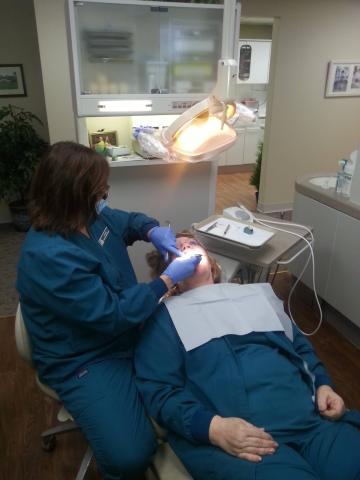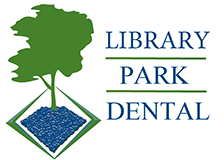Dental Hygienists Play an Important Role in Your Oral Health

Your dental hygienist has been trained to help you take better care of your teeth. At Library Park Dental your hygienist will take bitewing X-rays once a year unless there is a concern regarding a particular tooth that necessitates addition X-rays. She will then clean your teeth. But you can help improve your oral health by talking to her about how you care for your teeth. The dental hygienists at Library Park Dental will tell you to:
1. Brush Your Teeth Twice a Day.
- Be sure that your toothbrush is less than 3 months old. The heads get damaged and should be replaced every three months or after you have been sick.
- Use a soft-bristled brush with a rounded head so that you can get to all the nooks and crannies of your mouth.
- Use the right toothpaste. Some people can use a regular fluoridated toothpaste. Other people should use one for sensitive teeth. For other people, a toothpaste that helps to heal bleeding gums is indicated. While yet other people should use a prescription-strength fluoride paste. Your dental hygienist can help you decide which paste is best for you.
- Place the toothbrush at a 45-degree angle to your teeth and use vertical or circular motions. It should take 2 minutes to brush all surfaces, inside as well as outside and on the chewing surface of your teeth.
2. Floss Daily.
- Use a sawing motion instead of snapping the floss down to your gum. This prevents gum damage.
- Some people prefer to use soft picks, water picks, or waxed floss. Talk to your dental hygienist about what will work best for you.
3. Rinse with Mouthwash
- Rinsing with mouthwash will help to remove any biofilm or other bacteria on your tongue, cheeks, and roof of your mouth.
- Avoid an alcohol-based mouthwash if you have dry mouth.
- Some mouthwashes can do double duty by helping to whiten teeth. Ask your dental hygienist what mouthwash she thinks would be best for you.
4. Chew sugarless gum after meals for 20 minutes in order to stimulate the saliva glands. This will help to wash away any tiny particles of food left on the teeth, as well as help to neutralize the acid that may harm your enamel.
You are encouraged to see your dental hygienist at least twice a year. She can then make sure that problems can be identified early and taken care of quickly. Contact Library Park Dental today to make your dental hygiene appointment!
